This DC fast charger has more advanced quality and better texture. Because the materials used are EU standards.
Connector Standard: CCS1 / CCS2 / CHAdeMO / GBT *2
Communication Protocols: OCPP1.6J or OCPP2.0
Quality Certification: ISO9001, IATF16949, TUV, CE, ect.
Application: Highways, Urban Centers, Commercial Fleets, Public Transportation, Charging Stations, etc.
This DC Fast Charger can charge two EVs at the same time and intelligently distributes the charging power with its dynamic load balancing feature. This improves the utilization of charging power and increases profitability. It belongs to our high-end DC Fast Charger, which complies with EU standards from the inside out in terms of individual modules and materials. Therefore the quality and texture of the product is even better. The protection level is also higher. The relative cost is also more expensive. But it is worth every penny.
The two charging connectors support a wide selection of standards: CCS1 / CCS2 / CHAdeMO / GBT.
TKT DC Fast Charging Stations have a wide range of charging solutions. The products have been exported to more than 40 countries around the world. In particular, it has formed long-term and stable cooperative relationships with well-known companies such as BYD and Tata Motors.
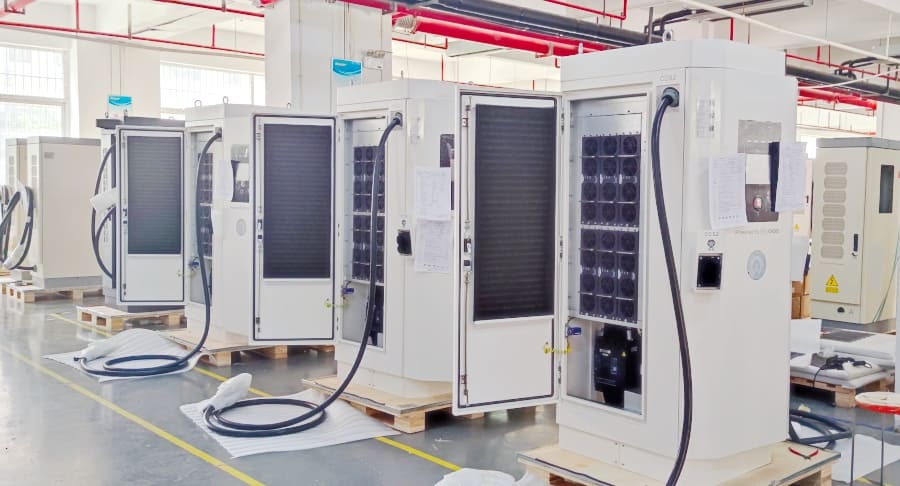
DC Fast Charger Factory
1. Compatible with OCPP1.6 and OCPP2.0 open charging protocol.
2. The cloud platform service system integrates Ethernet and 4G communication to realize billing, settlement, report statistics, equipment maintenance, remote monitoring and management.
3. Mobile phone App can realize functions such as positioning, code scanning charging, real-time inquiry, etc., and support various payment methods such as credit card.
4. Perfect security design. With real-time detection and safety protection, equipment abnormal pre-diagnosis, BMS independent safety protection and other functions. IP55 protection level. With over-temperature protection, short circuit protection, leakage protection, battery anti-reverse connection and other protection functions.
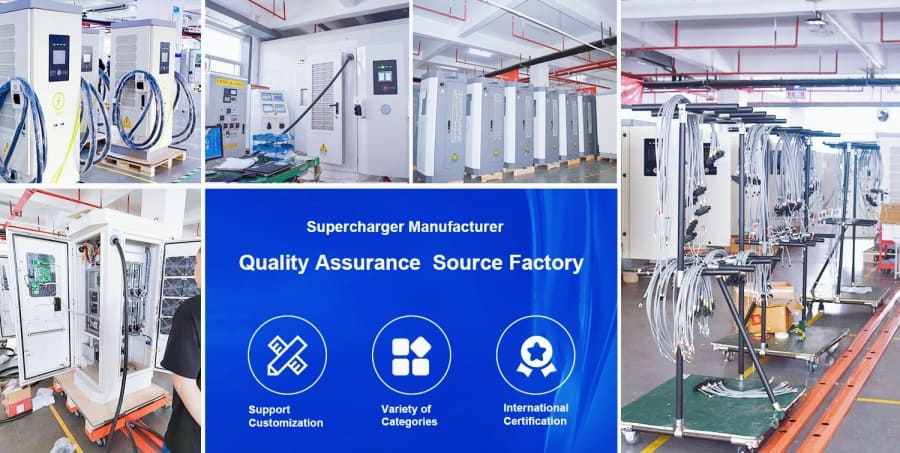
1. Multiple Protection: comprehensive protection for vehicles, people and equipment.
2. Modular Design: Upgrading and maintenance are flexible and simple.
3. Fast Charging: For common electric vehicles, charging time only takes 30 to 60 minutes.
4. Dynamic Load Balancing: improve charging efficiency and charging pile utilization.
5. Advanced Management System: easy for customers to operate. Manager data is clear.
6. Hundreds of Patents: excellent quality, affordable price.
Learn more about the 6 advantages
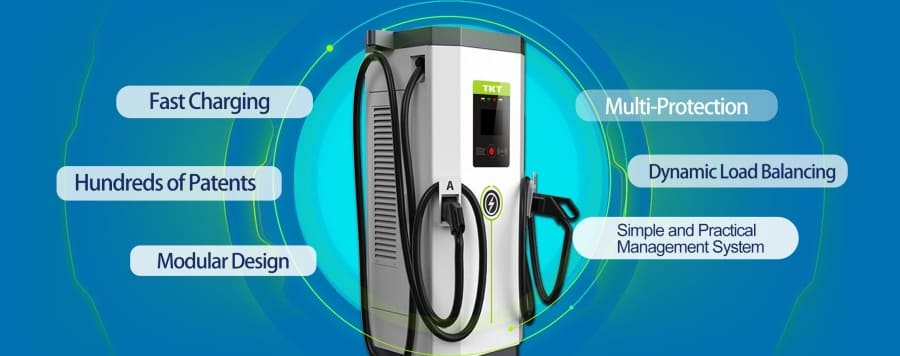

Please feel free to leave a message Email:md@tkt-hvac.com and let our experts provide you with expert advice. We support OEM customisation. (Scroll right to view the full content on mobile)

DC Charger Connector
| Power (kW) | 60kW / 90kW / 120kW / 150kW / 180kW / 200kW / 240kW / 300kW / 360kW | |||||
| Input Voltage | 3-Phase 400V/440V/480V+15% AC | |||||
| Working Frequency | 45-65Hz | |||||
| Charging Interface | CCS1 / CCS2 / CHAdeMO / GBT *2 | |||||
| Power Factor | ≥0.99 | |||||
| Efficiency | ≥94% | |||||
| Screen Size | 8” LCD Touchscreen (Maximum brightness above 800nit) |
|||||
| Support Language | Chinese, English, Russian, Other languages support customization | |||||
| Payment | Mobile APP / RFID / POS | |||||
| Network Connection | 4G, Ethernet | |||||
| Communication Protocols | OCPP1.6J or OCPP2.0 | |||||
| Charging Cable Length | 5m / 7.5m / 10m optional | |||||
| Working Temperature | -35°C – +55°C | |||||
| IP Class | IP55 The air inlet and outlet have a honeycomb design and are multi-layered waterproof. The mesh is dense, the air duct is shortened, and the heat dissipation area is large. Effectively prevent water spray from any angle. (overvoltage protection, undervoltage protection, overcurrent protection, short circuit protection, BMS independent security protection, etc.) |
|||||
| High Specification Materials | G60 corrosion-resistant hot-dip galvanized sheet and thickened aluminum-zinc coated sheet Double-layer anti-corrosion spraying process, in line with QUALICOAT CLASS 1 standard |
|||||
| Three-layer Air Filter | Stainless steel filter, G4 grade dust-proof filter cotton, long maintenance cycle, effectively dust-proof and moisture-proof, and prevent strong wind backflow. | |||||
| Certificate | ISO9001, IATF16949, TUV, CE, IEC61851-1,IEC 62196-2 | |||||
| If you need other more detailed technical parameters of the product, please contact us. Leave a message Email:md@tkt-hvac.com | ||||||
1. Charging solutions for large fleets
Common types include public transport, transportation and logistics industries. We have undertaken electric bus charging station in the USA, bus charging station in Canada, taxi car charging station in Australia, electric truck charging station in the UK, etc. Our DC Fast Charger has increased the frequency of vehicle trips by more than 20%.
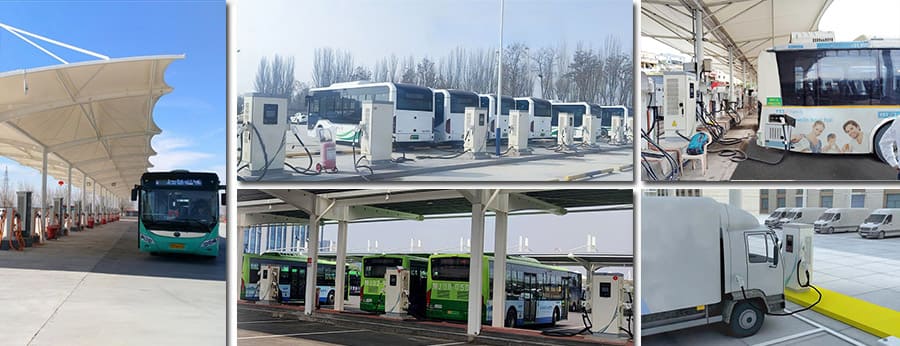
Click to view more high-definition cases
2. Charging Solutions for All Commercial Locations
With the popularity of electric vehicles, more and more business premises are in need of DC Fast Charger. For example, Office buildings charging stations, parking lot ev charging stations, ev charging stations for hotels, shopping mall charging station, gas station charger, etc. We have exported to more than 40 countries and regions including Thailand, India, Malaysia, Mexico, Germany, and France.
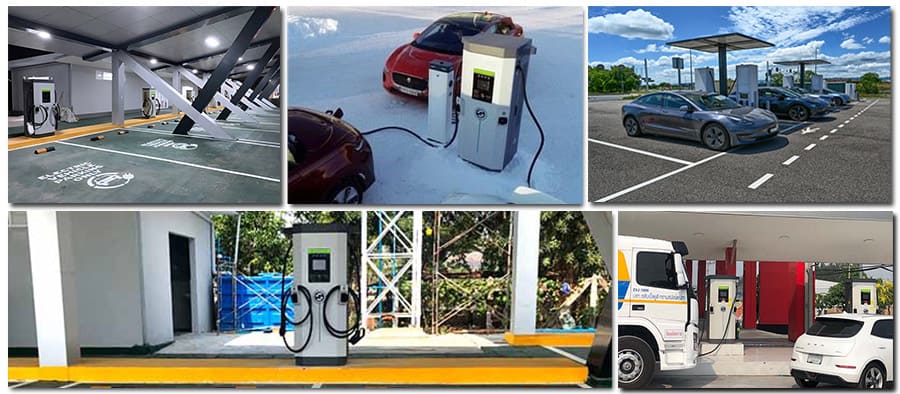
Click to view more high-definition cases
DC fast charger, also known as DC fast charging station, is a kind of professional charging equipment that quickly replenishes electric energy for electric vehicles through DC. This charging method can directly transfer DC high-voltage electricity to the vehicle’s power battery through the charging port, providing charging service for the vehicle in a short time with a large DC current.
Usually DC fast charger is level 3 EV charger, usually with power ranges of 30kw, 60kw, 90kw, 120kw, 150kw, 180kw, and 200kw. In general, level 3 EV charger is a highly efficient, fast, and convenient way of charging for electric vehicles that need to replenish electrical energy quickly.
DC charging station generally use three-phase, four-wire AC power of 380V ±15%, which can provide more current and power, usually between 30kW and 200kW. AC charging station is generally under 7kW.
Secondly, DC charging station adopts DC charging method. It has quickly converted AC power into DC power, which can be directly transmitted to the power battery. This way eliminates the slow process of converting AC power to DC power by the EV on-board charger.
The working principle of a DC fast charger is that it converts the input AC power into DC power through internal electronic devices (rectifier, inverter, etc.). The electric energy is then quickly delivered to the power battery of the electric vehicle through a high-power charging interface. In this way, the effect of fast charging can be achieved.
The AC charger is different. It only provides AC power to electric vehicles through sockets and cables. The electric vehicle charger then converts the alternating current into direct current for charging. Therefore, the charging speed is very slow.
Specifically, the workflow of the DC fast charger is as follows:
1. When an electric vehicle is connected to a DC fast charging station, the charger will first communicate with the vehicle to identify the vehicle’s charging needs and battery status.
2. The electronic device inside the fast charging station will convert the input AC power into DC power and adjust the output voltage and current according to the needs of the vehicle.
3. Direct current is delivered to the battery of the electric vehicle through a high-power charging interface to achieve fast charging.
4. When the battery is fully charged or reaches the predetermined charging level, the charger will automatically stop charging and notify the user that charging is complete.
During the entire charging process, the DC charging station will monitor the charging status of the battery in real time to ensure battery safety and charging efficiency.
The speed of DC fast charging station depends on a number of factors, including the size of the power battery capacity configured in the electric vehicle and the power of the charging pile. Generally speaking, DC fast charger can charge an electric vehicle to 80% of its capacity in 30 minutes, and it can be fully charged in about one hour.
I’ll use the Hyundai Kona electric vehicle 65 kWh as an example.
Charged at a level 2 charging station (7kw), the time for a full charge is about 9.29 hours.
Charging at TKT Level 3 charging station (180kw), the full charge time is about 22 minutes.
DC fast charger can provide voltages that typically range from 150 volts to 1,000 volts. The exact voltage value depends on the characteristics of the EV battery and the charging speed required. Higher voltages increase charging speeds, but also require more complex equipment and higher costs. This EU-Compliant DC Fast Charger of ours is made of raw materials of high EU standards. Therefore, it will all be more expensive than normal DC chargers.
The vast majority of electric vehicles can use DC fast chargers, but older electric vehicles may only support AC charging. The exact charging speed of an electric vehicle also depends on how much DC fast charging power the battery management system of the electric vehicle supports.
Generally speaking, no. This is because DC fast charger is more powerful and require a professional installation team, commercial high voltage and related safety measures. In addition, its cost is relatively high. For home users, AC slow chargers or portable charging devices are generally recommended for charging.

We attach great importance to product quality, and we will conduct up to 16 inspections again before each delivery. These include wiring and routing, insulation resistance checks, circuit breaker and emergency stop function checks, internal power supply DC checks, touch screen checks, thermistor checks, fan function checks, charging history checks, remote communication function checks, and more.

On April 7, TKT EV Solution, a manufacturer of new energy vehicle chargers and air conditioners, established its new Hainan company.
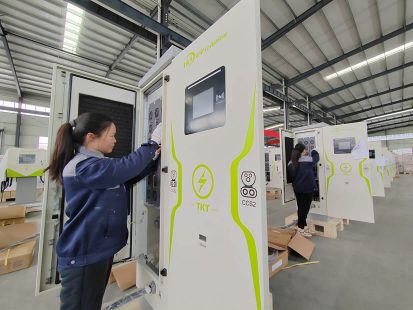
TKT is a leading China EV charger manufacturer with factories in China and India. We take innovative technology as our core competitiveness.
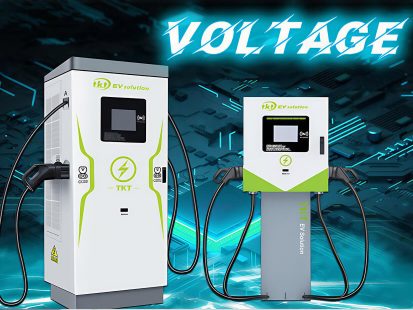
The EV charger is a precision device. If the EV DC charging voltage is not selected correctly, there will be many serious problems.